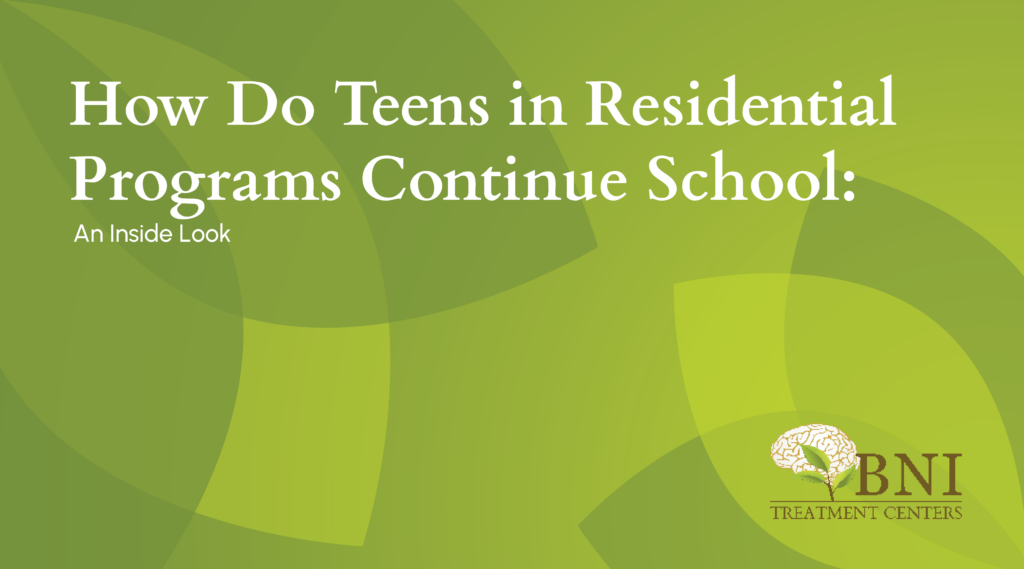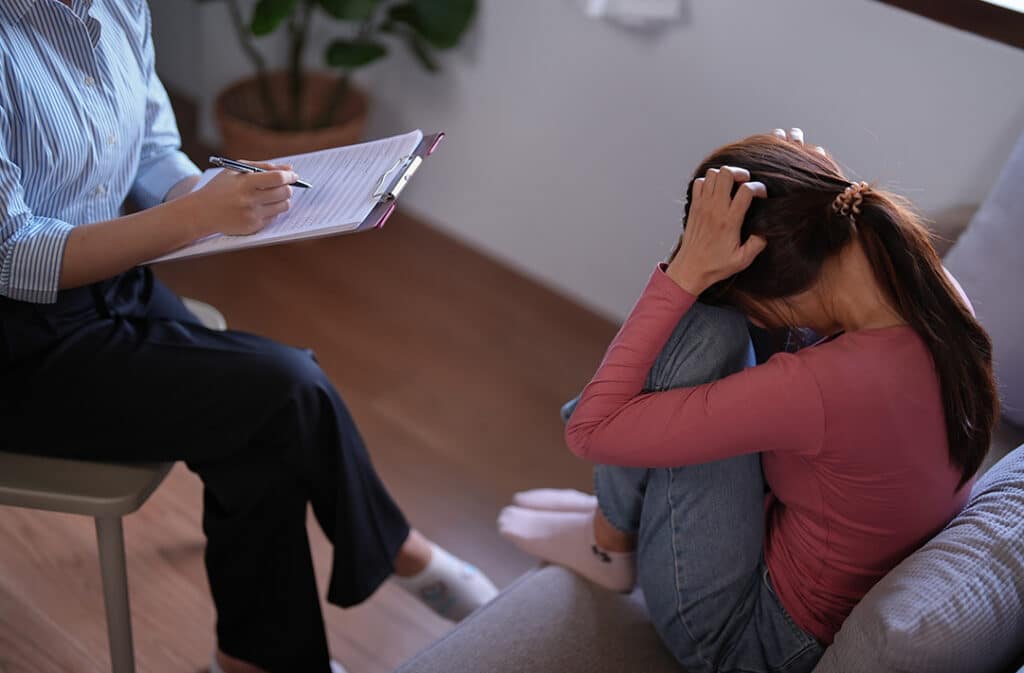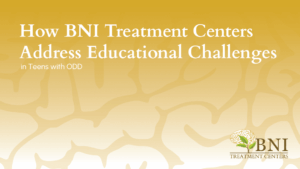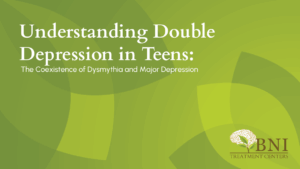
Academics are just as important as mental health for adolescents and teens, but how do they continue their education during residential treatment? By law, a facility must provide access to educational requirements established by the state and federal government. This includes communicating with school facilities or providing alternative methods through online options.
In LA County, 27.5% of teens reported needing help with their mental and emotional health in 2021. At BNI Treatment Centers, we provide a safe and intimate atmosphere for your teen to begin their mental health journey. Our expert team provides accurate diagnoses, proven treatment methods, and individualized attention. In this article, we will answer every parent’s question: How do teens in residential programs continue school?
The Critical Role of Continuing Education During Residential Treatment
Residential mental health or substance use disorder treatment often invokes feelings of fear and worry for parents. However, these treatments provide the support and care needed for adolescents to begin the process of recovery, learn about themselves, and work toward a brighter future. This does not negate the importance of education, and having time for schoolwork is just as important as having time for healing.
Continuing education within residential treatment settings contributes significantly to a teen’s sense of normalcy, self-worth, and future readiness. Academics provide structure and routine, both of which are often disrupted when entering an inpatient treatment program. Educational activities also serve as a method to evaluate cognitive functioning, motivation, and executive functioning capabilities. Neglecting this development aspect hinders reintegration once treatment is complete and can amplify existing academic and emotional gaps.
Academic Continuity for Adolescents in Residential Treatment Programs
Adolescents entering residential treatment are often removed from their school environments due to concerns with emotional instability, substance use, or severe mental health disorders. However, academic classes and skills must continue during this time. It is a requirement that residential facilities offer educational services that align as closely as possible with students’ home or school curriculum. This is on a government level as well as a state-by-state basis.
For a residential program to be academically successful, it must provide set timeframes for classes, which can be done through online schooling and with on-site tutors. Schools often have coordinators who relay what assignments need to be completed and when to help guide the facility. This allows for a tailored academic approach that honors the student’s learning profile and mental health needs. The academic structure is often designed according to what you would expect in traditional school systems, including core subjects and structured class periods.
One of the primary benefits of academic continuity during treatment is the prevention of educational delays. Students who maintain progress toward graduation or credit accumulation are more likely to transition back to traditional schooling without significant academic penalties. It also gives the confidence of being up to date with their friends on an academic level, easing their move from treatment back into school.
Exploring Alternative Educational Pathways During Treatment
Depending on the circumstances, there may be other pathways for education during treatment. Many schools offer online options to keep up with educational expectations. Some schools will have a representative to drop off assignments for the adolescent to complete and pick them up for grading. No matter the case, there are options to continue schoolwork and forgo falling behind.
Some teens may need specialized care during their learning hours. This can include tutoring or following an individualized education program (IEP). Those who have difficulties in school due to cognitive challenges or anxiety-related complications will have the environment needed during residential treatment to continue their studies in the way they need. This can include project-based learning, one-on-one instruction, online courses, or vocational training modules. These pathways provide students with flexibility, reduce performance pressure, and accommodate diverse learning styles.
Life skills are important to mental health treatment and academic success. Adolescents will be able to apply themselves through school work and learn valuable life lessons through guided therapies. Residential treatment serves as a way to gain academic knowledge and common-sense trades.

Reintegration Into Traditional Schooling Following Residential Treatment
Reintegrating into a traditional school setting following residential treatment can seem scary and confusing, especially as the adolescent navigates their new treatment plan. Students often return with improved emotional regulation and coping strategies, yet they may still face challenges related to stigma, academic gaps, or social reintegration. Studies have shown that developing a reintegration plan is necessary and should occur sooner to promote student success in the reentry process.
The key to reintegration is communication between school staff, parents, and the facility. Once treatment is complete, the adolescent has access to old friends, technology, and therefore, habits. For coping and learned skills to remain effective, the teen needs to have a plan for managing these triggers moving forward. This plan can be designed during treatment, ensuring all positive plans are in place to prevent concerning environments.
The post-discharge follow-up is another important element for both case workers and educational liaisons. Everyone must follow up on the reintegration plan to make sure it is executed effectively and that additional supports are implemented as needed. If, for some reason, attending regular school is not an option, all parties should create a plan for alternative education.
Balancing Therapeutic Goals With Academic Requirements
During residential treatment, it is much simpler to control how much time is spent on schoolwork, therapies, and stimulating activities. Adolescents in care are often working through mental health conditions, behavioral concerns, or emotional imbalances, all of which require daily therapeutic interventions such as individual therapy, group therapy, psychiatric monitoring, and family work. This is why the facility professionals put together a structured schedule to manage all of these in a way that is not stressful to the adolescent.
Once inpatient treatment is complete, however, it can be difficult to transition back to regular schooling and keep up with therapeutic goals and expectations. In this case, teachers, parents, and mental health professionals need to communicate effectively and report on progress as well as stress levels. Studies have shown that teachers who learn about student balances beyond the regular teaching curriculum are more likely to intervene when students struggle to maintain all of their responsibilities.
Monitoring Academic Progress and Setting Realistic Goals
Continuous monitoring of academic progress within residential treatment is essential to ensure that students remain on track, whether they intend to return to traditional school settings or pursue alternative education. This process begins with an initial academic assessment upon admission, followed by the development of individualized academic plans.
From there, it is imperative to develop a plan for the future. If the adolescent is of age to graduate or has the credits to do so early, continued education or career planning needs to take place. If they choose to attend online schooling, the treatment facility should work with parents to make sure all academic and therapeutic goals are in sync. Returning to their standard school environment needs to be met with realistic academic goals and personal mental health expectations.
Academic goals should be met with expectation, but also with grace. It is normal for performance to differ from pre-treatment to post-treatment. This does not necessarily mean the adolescent fell behind or is missing information – they may have learned a different way that still works. Parents can help their children with this transition by aiding in help with homework and asking questions about school.

Residential Programs at BNI Treatment Centers in Agoura Hills, CA
There is no reason to worry about school during teen residential treatment – most facilities require some form of educational services for teen clients. As a parent, it can be hard to imagine your child staying at an inpatient treatment center. However, they will be getting the care they need on all levels – emotionally, mentally, physically, and academically – all in one place, allowing them to heal and move forward with their life in a positive light.
BNI Treatment Centers is a full-service mental health treatment facility for adolescents and teens. Our center features on-site tutors as well as computer stations to ensure academics are just as high of a priority as mental health care. The dedicated case managers at BNI will ensure your child does not fall behind on their classwork, while our psychiatrist-led sessions provide top-tier services. Call us today at (888) 522-1504 to learn more about our program offerings.
BNI Treatment Centers: Science-based, evidence-backed, compassion-led.




